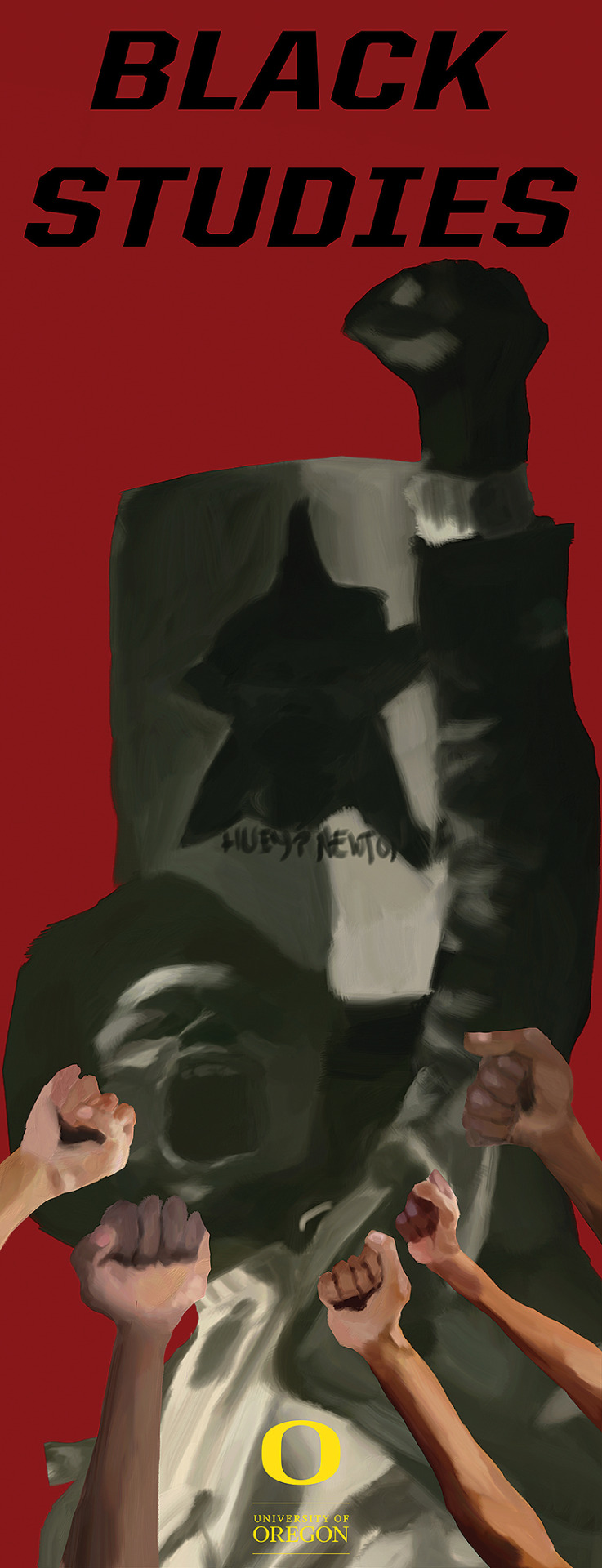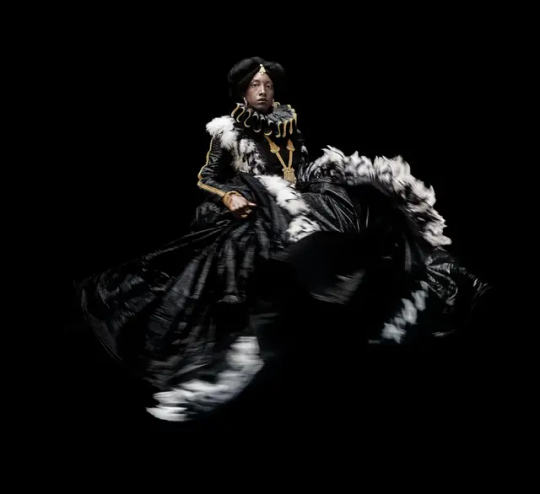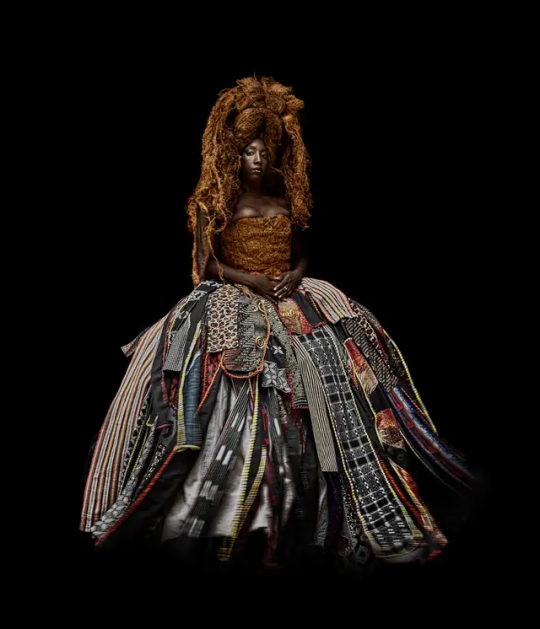#black studies
Explore tagged Tumblr posts
Text



#books#education#black power#black liberation#black panthers#black studies#kwame ture#stokely carmichael#blackintellect#black history#black woman#black men#black pride#black women#thesagittarianmind
260 notes
·
View notes
Text

Black Studies - Emory Douglas, from The Black Panther (newspaper), c1970
"We Want Education for Our People That Exposes The True Nature Of This Decadent American Society. We Want Education That Teaches Us Our True History And Our Role in the Present-Day Society. We believe in an educational system that will give to our people a knowledge of self. If a man does not have knowledge of himself and his position in society and the world then he has little chance to relate to anything else."
(No5 from The Black Panther Party Ten-Point Program of October 15, 1966)
PDF archive of The Black Panther news:
134 notes
·
View notes
Text

University Of Oregon Black Studies Banner (:
#digital art#graphics#web graphics#graphic design#digital artist#drawing#digital aritst#procreate#digital drawing#banner design#layout#blacklivesmatter#black beauty#black studies#black history#black liberation#blacktumblr#african american#black excellence#african history
58 notes
·
View notes
Text

San Francisco State College 1968: On strike, shut it down!
The strike, which lasted 5 months, was the longest student strike in U.S. history. The International Longshore and Warehouse Union played a significant role in the Strike. William “Bill” Chester, International Vice President of the ILWU, was part of the Select Committee, which was responsible for negotiating with student leaders to reach a settlement that resulted in establishing a Black Studies Department and a School of Ethnic Studies.
#SFSC#student strike#Black liberation#vietnam war#antiwar#protest#ILWU#ethnic studies#Black studies#students#Struggle La Lucha
67 notes
·
View notes
Text
"How to Go Mad is animated by deep concern for black people, mad people, and other beleaguered beings. If this project brings attention to people who have been persecuted because of their blackness and/or/as madness; if it alerts rationalist readers to the grave repercussions of demeaning the mentally ill; if it teaches techniques for practicing ethical, radical, critical, and beautiful madness; if it instigates righteous rage in the interest of social transformation; if it broadens understanding of who and what comprises a black radical tradition; if it encourages black studies to more carefully address madness; if it prompts mad studies to think more rigorously through blackness; if it urges black studies and mad studies to join forces; if it testifies to the possibility of bearing fruit in a "fruitless expanse" and finding home "nowhere at all"; if it models radical compassion; if it urges us toward liberation; or if it simply contributes to someone's relief or healing, then, to my mind, this book succeeds.
For some, healing might mean banishing madness. For others, healing might mean harnessing madness and putting it to good use--a readiness to rally the voices inside one's head rather than silence them. "
-How To Go Mad Without Losing Your Mind: Madness and Black Radical Creativity, 2021. By La Marr Jurelle Bruce, pg 34.
342 notes
·
View notes
Text
…TV and movies advertise killing as a very easy thing—how simple to blow somebody away. If it is that easy it shouldn’t be, and I didn’t want my character to be someone who felt the need to murder somebody.
Octavia E. Butler on writing Kindred (1979), interviewed by Frances M. Beal for The Black Scholar (1986)
#black studies#octavia e. butler#speculative fiction#black sci-fi#kindred#the black scholar#black women writers
7 notes
·
View notes
Text
6 notes
·
View notes
Note
On a previous ask, someone asked about racial capitalism and like what makes it different from regular capitalism
Yeah, I didn't explain what the term meant, although I wasn't asked that before.
To start with, according to Cedric Robinson in Black Marxism (1983), there is no difference because all forms of capitalism are racial capitalism, that capitalism by its nature produces racial oppression when it produces inequality.
So why coin the term?
The main thing that Robinson was trying to do was to shift the focus of Marxist thought on capitalism towards the way that capitalism extracts value specifically from the racially marginalized.
This has a lot to do with fights within Marxism about how to think about capitalism - for example, Robinson isn't a fan of the idea from Marx that capitalism was a progressive force vis-a-vis feudalism, and argues that capitalism simply displaced caste systems from Europe to Europe's colonies in the Americas, Asia, Africa, etc. through slavery and colonialism and later systems of racial oppression.
98 notes
·
View notes
Text
#ableism#intersectionality#black feminism#every month is black history month#black studies#disability#actually disabled#mutual aid#organizing#abolitionist#audre lorde
5 notes
·
View notes
Text




#books#education#black studies#black educators#black education#african studies#blackteaching#johnhenrikclarke#master teacher#thesagittarianmind
12 notes
·
View notes
Text

🌊
#art#poetry#words#rhetoric#dark academia#web weaving#light academia#philosophy tumblr#love#language#seulgee lee#critical theory#black studies#fred moten#cornel west#audre lorde#other lovings
2 notes
·
View notes
Text

A different kind of Star Trek television series debuted in 1993. Deep Space Nine was set not on a starship but a space station near a postcolonial planet still reeling from a genocidal occupation. The crew was led by a reluctant Black American commander and an extraterrestrial first officer who had until recently been an anticolonial revolutionary. DS9 extended Star Trek’s tradition of critical social commentary but did so by transgressing many of Star Trek’s previous taboos, including religion, money, eugenics, and interpersonal conflict. DS9 imagined a twenty-fourth century that was less a glitzy utopia than a critical mirror of contemporary U.S. racism, capitalism, imperialism, and heteropatriarchy.
Thirty years after its premiere, DS9 is beloved by critics and fans but remains marginalised in scholarly studies of science fiction. Drawing on cultural geography, Black studies, and feminist and queer studies, A Different Trek: Radical Geographies of Deep Space Nine (University of Nebraska Press, 2023) by Dr. David Seitz is the first scholarly monograph dedicated to a critical interpretation of DS9’s allegorical world-building. If DS9 has been vindicated aesthetically, this book argues that its prophetic, place-based critiques of 1990s U.S. politics, which deepened the foundations of many of our current crises, have been vindicated politically, to a degree most scholars and even many fans have yet to fully appreciate.
This interview was conducted by Dr. Miranda Melcher whose new book focuses on post-conflict military integration, understanding treaty negotiation and implementation in civil war contexts, with qualitative analysis of the Angolan and Mozambican civil wars.
#Star Trek#DS9#cultural geography#Black studies#feminist studies#queer studies#Deep Space 9#David Kroening Seitz#David Seitz#books#podcasts
3 notes
·
View notes
Text
"Thus primed, I propose that madness encompasses at least four overlapping entities in the modern West.
First is phenomenal madness: an intense unruliness of mind--producing fundamental crises of perception, emotion, meaning, and selfhood--as experienced in the consciousness of the mad subject. This unruliness is not necessarily painful, nor is it categorically pleasurable; it may induce distress, despair, exhilaration, euphoria, and myriad other sensations. In elaborating this mode of madness, I favor a phenomenological attitude attuned to whatever presents itself to consciousness, including hallucinations and delusions that have no material basis. Most important, phenomenal madness centers the lived experience and first person interiority of the mad subject, rather than, say, diagnoses imposed by medical authority.
Such diagnoses are the basis of medicalized madness, the second category in this schema. Medicalized madness encompasses a range of "serious mental illnesses" and psychopathologies codified by the psy sciences of psychiatry, psychology, and psychoanalysis. These "serious" conditions include schizophrenia, dissociative identity disorder, bipolar disorder, borderline personality disorder, and the antiquated diagnosis of medical "insanity," among others. I label this category medicalized madness, emphasizing the suffix -ize, meaning to become or to cause to become--to signal that mental illness is a politicized process, epistemological, operation, and sociohistorical construction, rather than an ontological given...
...Even forms of medicalized madness that are measurable in brain tissue physiology, neuroelectric currents, and other empirical criteria are infiltrated (and sometimes constituted) by sociocultural forces. The creation, standardization, collection, and interpretation of psychiatric metrics take place in the crucible of culture. Likewise, clinical procedures are designed and carried out by subjective persons embedded in webs of social relations. And furthermore, psychiatry is susceptible to ideology. Exploiting that susceptibility, various antiblack, proslavery, patriarchal, colonialist, homophobic, and transphobic regimes have wielded psychiatry as a tool of domination. Thus, acts and attributes such as insurgent blackness, slave rebellion, willful womanhood, anticolonial resistance, same-sex desire, and gender subversion have all been pathologized by Western psychiatric science. Beyond these overt examples of hegemonic psychiatry, I want to emphasize that no diagnosis is innocently objective. No etiology escapes the touch and taint of ideology. No science is pure.
The third mode of madness is rage: an affective state of intense and aggressive displeasure (which is surely phenomenal, but warrants analytic distinction from the unruliness above). Black people in the United States and elsewhere have been subjected to heinous violence and degradation, but rarely granted recourse. Consequently, as singer-songwriter Solange Knowles reminds us, black people "got the right to be mad" and "got a lot to be mad about." Alas, when they articulate rage in American public spheres, black people are often criminalized as threats to public safety, lampooned as angry black caricatures, and pathologized as insane. That latter process--the conflation of black anger and black insanity--parallels the Anglophone confluence of madness meaning anger and madness meaning insanity. In short, when black people get mad (as in angry), antiblack logics tend to presume they've gone mad (as in crazy).
The fourth and most capacious category in this framework is psychosocial madness: radical deviation from the normal within a given psychosocial milieu. Any person or practice that perplexes and vexes the psychonormative status quo is liable to be labeled crazy. The arbiters of psychosocial madness are not elite cohorts of psychiatric experts, but rather multitudes of avowedly Reasonable people and publics who abide by psychonormative common sense. Thus, psychosocial madness reflects how avowedly sane majorities interpellate and often denigrate difference. What I have already stated about medicalized madness can also be adapted to psychosocial madness: acts and attributes such as insurgent blackness, slave rebellion, willful womanhood, anticolonial resistance, same-sex desire, and gender subversion have all been ostracized as crazy by sane majorities who adhere to Reasonable common sense...
...Yet it seems to me that psychosocial madness reveals more about the avowedly sane society branding an object crazy than about the so branded. When you point at someone or something and shout Crazy!, you have revealed more about yourself--about your sensibility, your values, your attentions, your notion of the normal, the limits of your imagination in processing dramatic difference, the terms you use to describe the world, the reach of your pointing finger, the lilt of your accusatory voice--than you have revealed about that supposedly mad entity."
-How to Go Mad Without Losing Your Mind: Madness and Black Radical Creativity by La Marr Jurelle Bruce, 2021, pg 6-8.
#personal#mad studies#black studies#disability studies#mad liberation#antipsychiatry#mad pride#psych abolition
19 notes
·
View notes
Text









From the Deep: In the Wake of Drexciya with Ayana V. Jackson
"Artist Ayana V. Jackson creates an undersea realm honoring those who jumped or were thrown overboard during the trans-Atlantic slave trade." (Smithsonian Magazine, 8 June 2023)
Where There Is No Origin But Memory I
The Self-Forgetfulness of Belonging Will Never Be Mine I
Consider the Sky and the Sea
Some People Have Spiritual Eyes II (featuring the dress which also appears as "Use the Stars to Fix a Celestial Navigation Point," with materials including Ghanaian currency, paste, cotton, raffia reed fans)
When the Spirit of Kalunda Comes So Does Kianda
Some People Have Spiritual Eyes I
Reliquary: The Sea Has Nothing to Offer but a Well-Executed Grave
It is Only When You Lose Your Mother That She Becomes Myth
I Summon the Voice from the Deep I
[images from the official exhibition website]
Also -- for those interested, many of these garments and models appear in video-works in collaboration with other artists! Very cool.
#From the Deep#Ayana V. Jackson#art#african art#in the wake#transatlanticism#Lose your mother#Black studies#costumes#mixed media#multimedia#dresses#costume#gold coast#africa#National Museum of African Art#fantasy#critical fabulation#underwater utopia#african american#fashion#photography#critique#installation#museum#aquatopia#underwater#movement#dance
4 notes
·
View notes
Note
Howwwww are you paying for law school!!
Well, my dear. It really depends who's asking. If you like ankle pics, than you are. 🤫😛
#ask me anything#ask#ask blog#ask bait#law school#black tumblr#black beauty#beautiful#love#black students#black studies#graduate student#black women
5 notes
·
View notes
Text
The evolution of my thinking comes from a combination of elevating my own political education by reading the works of Black radical thinkers and being in conversation with Black radical organizers. These are the types of experiences that helped to inform the work and political framework of Know Your Rights Camp, a nonprofit organization I co-founded in service of building power in our communities.
Colin Kaepernick in interview with Indigo Oliver in The New Republic. “Black History Is an Absolute Necessity.”
A conversation with Colin Kaepernick on Black studies, white supremacy, and capitalism
Our History Has Always Been Contraband: In Defense of Black Studies. Edited by Colin Kaepernick, Robin D. G. Kelley, and Keeanga-Yamahtta Taylor
Haymarket Books is a great book publisher and they're offering this book as a free Ebook. It's important to support organizations like Haymarket.
11 notes
·
View notes